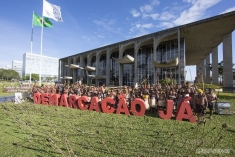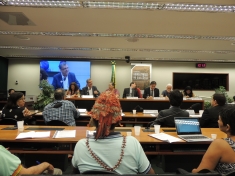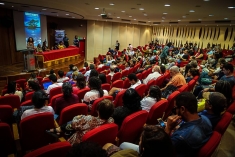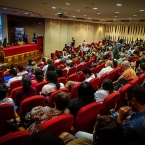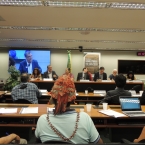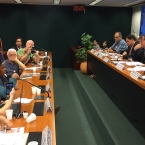Raising Voices and Strengthening Alliances in the Amazon
Two weeks ago, at the 20th anniversary celebration of Democracy Now!, Noam Chomsky reminded the crowd that, despite the astounding toxicity of the US presidential campaign and the disheartening election of Donald Trump, there are still important signs of hope and change - as exemplified by the historic mobilization of indigenous peoples at Standing Rock and the enormous energy for progressive change, propelled largely by young people, that coalesced around the candidacy of Bernie Sanders.
In a similar vein, amidst Brazil’s current political turmoil, with its alarming trends of backsliding on environmental protection and human rights, there are positive signs of change. A case in point is that indigenous peoples and other grassroots movements in the Amazon, with support from their allies, are strengthening alliances to their defend their rivers and rights in the face of an unprecedented wave of planned hydroelectric dams and destructive mega-projects in the transportation, mining and agribusiness sectors.
Over the past few weeks, the capital city of Brasilia has been the stage for various events that highlighted such strength and unity. First, a delegation of Munduruku representatives – after travelling three days by bus from the Tapajós river – staged a series of protests and engaged government officials, demanding the demarcation of a traditional territory known as Sawre Muybu or Daje Kapap Epi. Significant portions of the territory would be flooded by the huge São Luiz do Tapajós Dam, which was suspended by the federal environmental agency, IBAMA, last August. Though the project was cancelled, various politicians, bureaucrats and powerful corporate actors have not yet given up on it.
Several Munduruku stayed on in Brasilia the following week to meet with indigenous leaders and representatives of other grassroots movements from the Madeira, Tapajós, Xingu and Tocantins rivers. Activities were centered around a seminar in Congress entitled “Hydroelectric Dams in the Amazon: Socio-Environmental Conflicts and Alternatives.” The event was organized by the Panamazonian Rivers Alliance and other civil society networks working on infrastructure, energy and climate justice issues, in conjunction with the environmental commission (CMADS) of the lower house of Congress, with active support from International Rivers.
Three thematic sessions focused on key issues: chronic problems in the planning and licensing of dams; the socio-environmental responsibility of financial actors (especially the Brazilian Development Bank – BNDES); and sustainable energy alternatives to destructive dams. The event allowed affected and dam-threatened peoples to raise their voices in Brasilia in a public event that involved direct encounters with government authorities whose decisions directly affect their lives.
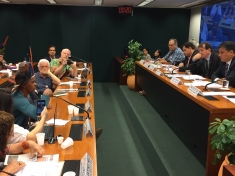
On the evening prior to the seminar in Congress, we held a special event to premier “Belo Monte: After the Flood,” the new documentary co-produced by International Rivers with award-winning filmmaker Todd Southgate, Amazon Watch and Cultures of Resistance. The event was a huge success. Todd and several leaders from the Xingu who appear in the film were present, including Antônia Melo from Movimento Xingu Vivo, and Giliarde Juruna. Actors and celebrities involved in the movement to protect rivers and river defenders in the Amazon also joined the film, launch, including Maria Paula Gontijo, who served as emcee, and Victor Fasano.
“Belo Monte: After the Flood” is intended as a tool for raising public awareness about the egregious social and environmental consequences of the Belo Monte Dam on the Xingu River. By telling the stories of the affected people, we hope to strengthen grassroots opposition to similar boondoggles elsewhere in the Amazon. Recently, the film was awarded the Popular Jury Award for best film at Cineamazonia, the most prestigious film festival in the Amazon and one of the most important in Latin America.
Besides the public events, indigenous leaders and other grassroots activists from the Madeira, Xingu, Tapajos and Tocantins basins and their allies gathered for internal meetings to discuss strategies for strengthening the alliance to protect rivers in Amazonia. Members of the “Regional Coalition for Transparency and Participation,” a civil society network engaged in issues related to infrastructure projects, banks and governance, also participated in internal meetings and the seminar in Congress, through representatives from Bolivia, Peru, Ecuador and Colombia.
- Watch short video with highlights from the seminar (in Portuguese)
- Video recording of seminar (website of Brazilian Congress)
- Slide presentations
- Visit the Facebook page for news on the film "Belo Monte: After the Flood"
- Visit the website for "Belo Monte: After the Flood"
Articles in Portuguese:
- Debate sobre hidrelétricas na Amazônia mobiliza ONGs, MPF, legislativo e poder público no Congresso Nacional, no dia 6, ICV, 11/30/2016
- Seminário e filme discutem hidrelétricas na Amazônia, em Brasília, ISA, 12/5/2016
- Belo Monte: Depois da Inundação, Greenpeace, 12/6/2016
- Hidrelétricas da Amazônia na berlinda, ISA, 12/7/2016
- Hidrelétricas: falta de consulta prévia aos atingidos é o primeiro problema da fase de licenciamento ambiental, aponta MPF, PGR, 12/7/2016
- Viva Maria: Documentário retrata a mudança na vida de mulheres provocada por Belo Monte, Radio Nacional da Amazônia, Radio Nacional da Amazônia, 12/7/2016
- Farsa de Belo Monte desmontada em 1h, OPAN, 12/8/2016
- Organizações assinam manifesto sobre cenário desafiador da Amazônia coberta por hidrelétricas, ICV, 12/8/2016
- Do Xingu ao Teles Pires: documentários retratam os impactos de grandes hidrelétricas nas vozes dos atingidos, ICV, 12/9/2016
- Seminário debate alternativas, Correio do Tocantins, 12/10/2016
- Nem mais uma hidrelétrica na Amazônia, OPAN, 12/15//2016

